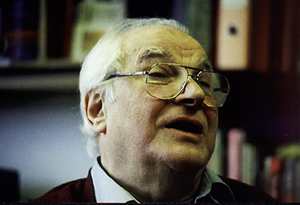 | |||
| cont HOW DID YOU DISCOVER FILM? That’s a really intriguing question because initially I just wanted to do good. I’ve got to go into a bit of my biography. It was 1936, I was fifteen and the Spanish civil war had begun. Our heroes were our mates who were a little older than we were who had joined the International Brigade and fought in Spain. We were in the League of Youth, which was the Labour Party’s youth organisation at the time. Among the officials was a bloke called Ted Willis, and he very rapidly rounded us up and asked us if we wanted to join the Mile End Young Communist League. We collected milk, we collected money, some medical supplies, all sorts of things, and if we were old enough we would try to get into the International Brigade. It wasn’t mass heroics, but that was the struggle. In a situation of everything is black and white, it was easy to come to decisions about what was right and what was wrong. Lenin, for whom one had a high regard, had said: "Of all the arts, for us the most important is the cinema." I thought: If Lenin says that film is the key thing, that’s what I want to get into. And that’s really how the idea began, that film was important, and I was happy to do it. I carried that with me. I left school. My main education was in the lectures of the Marx Memorial Library, where Lenin had edited the Russian émigré newspaper Iskra: The Spark, when he was in exile in London. I attended those lectures night after night, and that was my political education. I had very distinguished lecturers. There was biology, philosophy, writing, there was literature, there was the history of the old CPSU, and so on. I think that that basic education, 1937 until the beginning of World War Two was a phase where I became what I am. So that’s really the root of the inspiration: Marxism, the effect of the Spanish civil war, the comrades who were around in the YCL, in which I rose rapidly. I became the cultural secretary of the Young Communist League in 1937/38. Anyway, that’s the root of the inspiration. | |||
 | |||
| TELL US ABOUT YOUR MOVE INTO FILMMAKING. A man at the British Soviet Friendship Society, my very first post war job, got me a job at the trade union, the CSU. I enjoyed it, but I couldn’t sustain the life, because I was the national organiser and it meant rolling around the country recruiting. I went to Ivor Montagu, who was a constant source of inspiration, He was a table tennis champion, and he worked with Alfred Hitchcock as his assistant director, he made his own documentaries. He was an aristocrat in the truest sense of the word, and he was also a Communist. It was Ivor who encouraged me to form an organisation, because they had money at the British Soviet Friendship Houses. We began creating Plato Films and that was, primarily, distribution for films from the socialist world. That meant the Soviet Union, China, Eastern Europe, Vietnam, Mongolia, North Korea. I had a staff of one. I brought the films into the country, I went to customs, imported the films, paid the customs duty, took the films out to the people, it was a one-man band. But I began to feel that the answer to what I wanted to achieve, politically, was not just pushing out films, because the films weren’t all Battleship Potemkin, and we were never able to do much with them in the commercial cinema. No one has ever been able to do much with Russian and East European film at the Odeon at the bottom of the road. So, I began to think we’ve got to make our own films. It sounds hard: film producer, but believe me it is not difficult to learn the trade. I began to make lots and lots of films. You have to remember that among the countries whose films we were distributing was East Germany, and they were vital in our developments because they had no embassy. They had no diplomatic relations, and they desperately needed friends and allies in other countries and they began to help us, by sending us films, by giving us technical help, and that’s how I really learnt the job. I didn’t learn it academically, although I read books. I learnt filmmaking from people who make films. Let’s say I’ve picked it up rather than learnt filmmaking. | |||
| | |||
| | |||
| This page last updated | |||